Best Ecommerce SEO Tools for Online Store Optimization
Ecommerce SEO tools are the backbone of Search Engine Optimization (SEO). Whether you have an ecommerce business or any other type of business, seo tools play an important role in various aspects of seo like keyword research, improve presence of your online ecommerce store, and drive more traffic to your website. Ecommerce SEO Tools also helps in analyzing the performance of your business, with their accurate data insights. Using these ecommerce seo tools, helps you time and energy and give better results. Here are a few top choices of users of ecommerce seo tools.
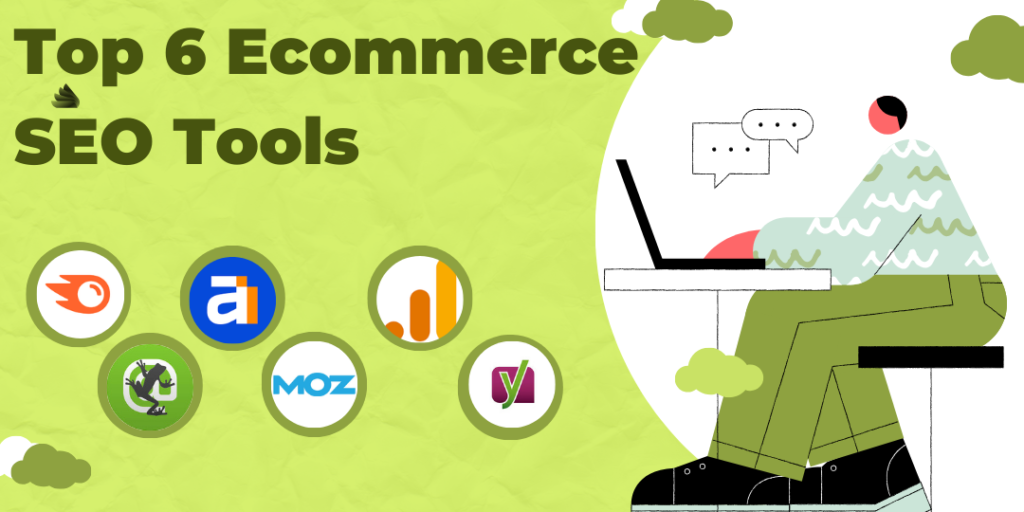
Importance of Ecommerce SEO Tools
- Increased Visibility and Traffic: Ecommerce SEO tools are used by businesses to improve their search engine rankings and bring traffic of the right users to their websites. As visibility increases, conversions also increase on websites, that ultimately leads to sales.
- Improved User Experience: Ecommerce SEO tools are being used to analyze the site performance, identifying areas for improvement such as page load times and mobile responsiveness, image quality, content optimization. These components are a checklist for better user experience that leads to higher engagement and conversion rates.
- Competitive Analysis: Ecommerce SEO tools provide insights into competitors’ strategies, like their keywords, backlinks, and content. Understanding the competition helps e-commerce businesses to develop better understanding of strategies and use them properly to build proper SEO strategies.
- Keyword Optimization: By using Ecommerce SEO tools, you can easily identify relevant keywords that potential customers use to find products or services on search engines. Optimizing product descriptions, meta tags, and content with targeted keywords, we can attract the right users to our websites and increase conversion rates.
- Content Strategy: Ecommerce SEO tools are used to get content ideas and trends from top ranking domains to get proper idea about creating a site structure. With proper content ideas, search terms. We can create high quality and SEO friendly content.
- Local SEO: Local SEO is necessary and the first step to establish a brand for any e-commerce businesses. Targeting nearby physical locations,markets with help of local SEO. Ecommerce SEO tools help businesses to optimize websites and increase brand awareness, so that it appears in local search results, attracting nearby customers and increasing conversions.
- Tracking and Analytics: Ecommerce SEO tools provide detailed analytics on site performance, traffic sources, and user behavior. Data-driven decisions can be made to optimize marketing strategies and improve ROI.
- Cost-Effective Marketing: SEO is a cost-effective marketing strategy compared to paid advertising. It requires an initial investment but gives long-term benefits of improved rankings and brings the right set of users to your website and increases conversions.
- Enhanced Social Media Integration: Ecommerce SEO tools can optimize social media profiles and posts, driving traffic from social platforms to the ecommerce store. Strong social media presence supports SEO efforts and increases overall brand visibility.
- Building Brand Credibility: Higher search engine rankings show trust and authority to potential customers. Consistently appearing at the top of search results builds brand credibility and customer confidence.
Key Components of Ecommerce SEO Tools:
Keyword Research:
Keyword research is the first step of creating an effective ecommerce SEO strategy. Keywords help identify the queries or terms that potential customers use to find products on search engines. So it is necessary to target the right keywords, to attract right traffic, improve search engine rankings, and increase conversions.
Keywords Research Tools:
- SEMrush offers proper keyword analytics, competition analysis, long tail keywords, and keyword difficulty scores.
- Ahrefs is known for its accurate backlink analysis and proper keyword database.
- Ubersuggest is a user-friendly tool that provides keyword suggestions, search volume, and competitive data.
Site Architecture:
A well-structured site is important for both user experience and SEO. It helps search engines crawl and index your site efficiently, improves navigation, and improves the overall user experience, leading to higher engagement and conversions.
Tools for Outline Generator:
Outline Generator: Zero Dimension’s AI outline generator tool utilizes artificial intelligence to help in creation of structured outlines for various types of content. It gives appropriate prompts to generators to provide content ideas on a topic or a set of keywords. This tool then creates a proper outline for a blog posts including headings, subheadings, and suggested points to cover. The primary use of this tool is to focus on content creation, which helps writers to focus on creating SEO-friendly content.
On-Page SEO:
Unique and detailed product descriptions not only help search engines understand your products better but also enhance the user experience by providing valuable information that can influence purchasing decisions.
Tools for On-Page SEO:
Meta Title Generator: An SEO Meta title created properly, catches the attention of right users as it represents our digital presence. It must create a proper first impression of our content to increase click through rate. With Zero Dimensions’ free Meta title generator tool you can easily generate SEO-friendly articles, blog posts, web pages, and other digital content optimized for search engines.
Link Building:
Backlinks are a critical factor in search engine ranking algorithms. High-quality backlinks from proper sites signal to search engines that your site is trustworthy and relevant.
Tools for Link Building and Analysis
- Moz Pro: Offers comprehensive link analysis, tracking, and outreach tools.
- Ahrefs: Provides in-depth backlink analysis and competitive benchmarking.
- BuzzSumo: Helps identify trending content and influencers for outreach opportunities.
Top 6 Ecommerce SEO Tools
1. Ahrefs: Ahrefs is a good ecommerce SEO tool known for its powerful backlink analysis and keyword research capabilities. It works by crawling the web to provide insights into your website’s backlink profile, keyword rankings, and overall SEO health. Ahrefs is best for e-commerce businesses because it offers detailed competitor analysis, allowing you to understand and perform better than your competitors in search engine rankings.

Features:
- Extensive backlink analysis
- Keyword research and difficulty analysis
- Competitor analysis
- Site audit for identifying SEO issues
- Content Explorer for finding popular content
2. SEMrush: SEMrush is an all-in-one Ecommerce SEO tool that provides complete data for keyword research, site audits, and competitive analysis. It works by collecting data from multiple sources to give an overview of your website’s SEO performance. SEMrush is ideal for e-commerce businesses due to its ability to track competitors’ strategies and provide actionable insights to improve your own SEO efforts.
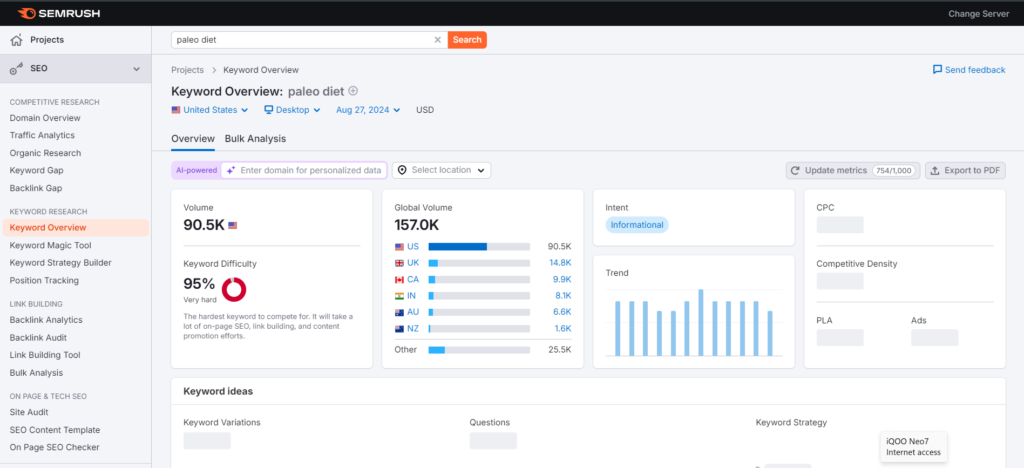
Features:
- Keyword research and tracking
- Site audit and health check
- Competitor analysis and benchmarking
- On-page SEO recommendations
- Backlink analysis and outreach tools
3. Moz Pro: Moz Pro offers a set of Ecommerce SEO tools designed to help businesses improve their search engine visibility. It works by providing keyword suggestions, link building opportunities, and site audits. Moz Pro is best for e-commerce businesses because of its user-friendly interface and actionable insights that help in optimizing product pages and driving organic traffic.
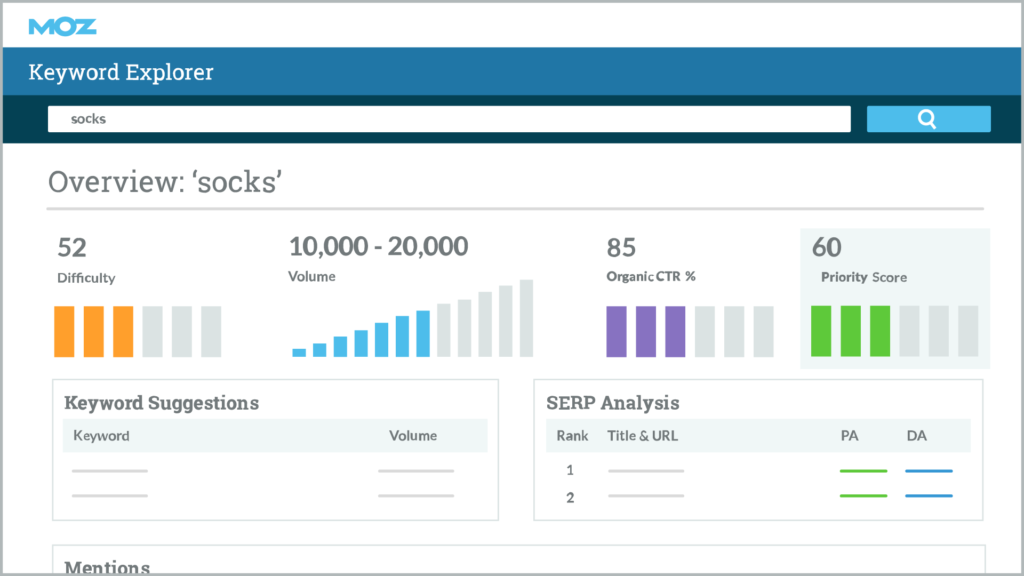
Features:
- Keyword research and SERP analysis
- On-page optimization recommendations
- Site crawl and audit for technical SEO issues
- Link building tools and analysis
- Rank tracking and reporting
4. Yoast SEO: Yoast SEO is a popular WordPress plugin that helps optimize website content for search engines. It works by providing real-time suggestions as you create content, ensuring that your pages are SEO-friendly. Yoast SEO is particularly useful for e-commerce businesses using WordPress, as it simplifies the process of on-page SEO and ensures that all technical aspects are covered.
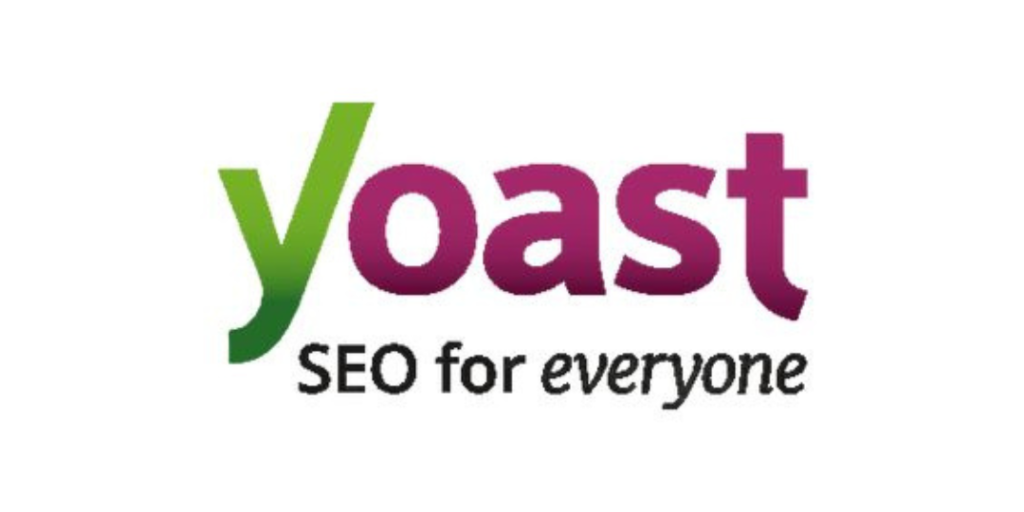
Features:
- Real-time content analysis
- XML sitemap generation
- Meta tags and schema markup
- Readability check and suggestions
- Integration with Google Search Console
5. Screaming Frog: SEO Spider Screaming Frog SEO Spider is a website crawler that helps identify technical SEO issues. It works by crawling your website’s URLs and analyzing elements such as meta tags, headings, and images, blog posts. This tool is best for e-commerce businesses with large websites, as it provides a detailed audit of your site’s SEO health and identifies areas for improvement.
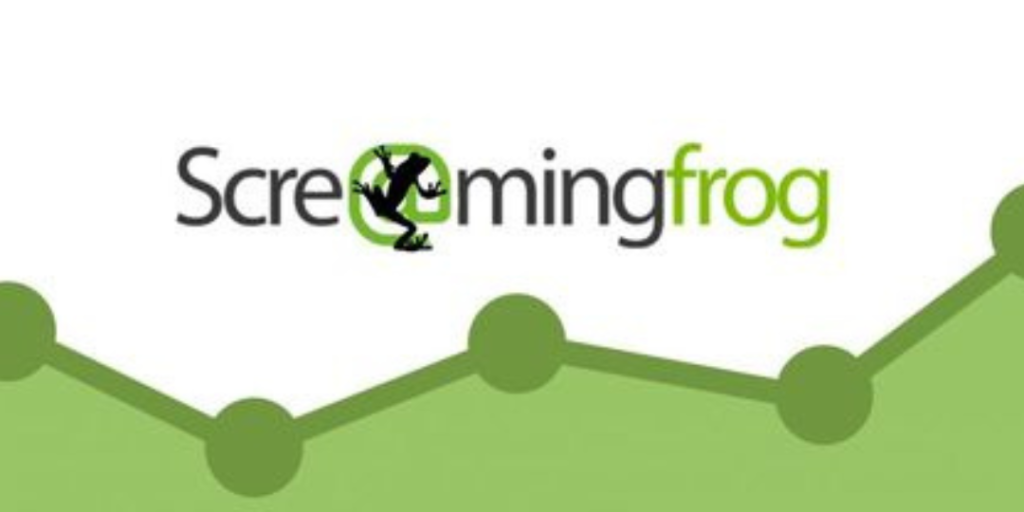
Features:
- Comprehensive site audit and crawl
- Identification of broken links and redirects
- Analysis of meta tags and on-page elements
- XML sitemap generation
- Integration with Google Analytics
6. Google Search Console: Google Search Console is a free service offered by Google that assists in observing and managing your website’s visibility in search outcomes. It works by providing data on how Google views your site, including indexing status, search queries, and crawl errors. For e-commerce businesses, Google Search Console is essential for understanding how your site is performing in search results and for identifying and fixing issues that could affect your rankings.

Features:
- Performance monitoring and reporting
- Index coverage analysis
- Search query data and insights
- Identification of crawl errors and security issues
- Mobile usability and AMP reports
| Feature | Ahrefs | SEMrush |
|---|---|---|
| Keyword Research | Extensive keyword database, accurate search volume, keyword difficulty scores, competitor keyword analysis, trend data | Broad keyword suggestions, detailed difficulty analysis, accurate volume metrics, Keyword Magic Tool, topic research tools |
| Site Audit | Robust site audit, identifies common SEO issues, technical errors, on-page problems, improvement recommendations | Comprehensive site audit, detects SEO issues, technical errors, on-page and off-page problems, detailed recommendations |
| Backlink Analysis | In-depth backlink analysis, large backlink index, historical data, backlink growth tracking | Detailed backlink analysis, extensive backlink index, historical data, backlink audit and toxic link removal |
| Rank Tracking | Accurate rank tracking, updates on ranking positions, desktop and mobile tracking, global and local tracking | Precise rank tracking, regular updates, desktop and mobile tracking, global and local SERP tracking |
| Content Marketing | Content gap analysis, top-performing content identification, keyword suggestions for content | Content analyzer, SEO content template, topic research, content ideas, SEO writing assistant |
| Competitor Analysis | Strong competitor analysis, competitor keyword and backlink analysis, domain comparison | Excellent competitor analysis, keyword gap tool, backlink gap tool, competitor traffic analytics |
| Technical SEO | Technical SEO analysis, site performance insights, crawl report, page speed insights | Detailed technical SEO audit, site performance insights, crawl report, page speed optimization |
| On-Page SEO | On-page SEO checker, HTML improvements, content suggestions | On-page SEO checker, SEO content template, content optimization recommendations |
| Integration with Other Tools | Limited integrations | Extensive integrations with Google Analytics, Google Search Console, social media platforms, and other tools |
| Pricing | Various plans, higher cost tier | Various plans, competitive pricing |
| User Interface | User-friendly, intuitive | Comprehensive, slightly complex |
| Support and Resources | Extensive help center, tutorials, customer support | Comprehensive support resources, tutorials, customer support |
| Free Trial | Yes, limited trial available | Yes, free trial available |
Conclusion
Choosing the right SEO tools can really improve your ecommerce business’s online visibility and performance. Each of these tools offers unique features and benefits that serve different aspects of SEO, ensuring that your website is optimized for search engines and providing a better experience for your customers.
Why do Ecommerce websites need SEO tools?
SEO tools help ecommerce websites improve search engine rankings, drive organic traffic, and improve user experience, leading to higher sales and better visibility.
How can Ecommerce SEO tools improve my online store's visibility?
SEO tools can optimize keywords, improve site architecture, on-page SEO, and analyze competitors, which collectively boost your store’s search engine ranking and visibility.
What are the best Ecommerce SEO tools available?
Top ecommerce SEO tools include SEMrush, Ahrefs, Moz Pro, Screaming Frog, and Ubersuggest.
Can SEMrush be used for Ecommerce SEO?
Yes, SEMrush offers comprehensive SEO tools for keyword research, site audits, competitor analysis, and tracking SERP positions, making it ideal for ecommerce SEO.
What is the role of keyword research in Ecommerce SEO?
Keyword research identifies the terms potential customers use to find products, helping optimize product descriptions, category pages, and blog content to rank higher in search results.
What features should I look for in an Ecommerce SEO tool?
Look for features like keyword research, site audit, backlink analysis, competitor analysis, on-page SEO optimization, and performance tracking.
How does backlink analysis impact Ecommerce SEO?
Backlink analysis identifies high-quality links pointing to your site, helping improve domain authority and search engine rankings, which boosts organic traffic.
Are there any free Ecommerce SEO tools?
Yes, free Ecommerce SEO tools include Google Analytics, Google Search Console, Ubersuggest (basic features), and Moz’s free tools.
What is the importance of on-page SEO for Ecommerce websites?
On-page SEO ensures that individual web pages are optimized for search engines, improving relevancy, user experience, and the likelihood of higher rankings and conversions.
How do technical SEO tools like Lumar help improve site performance?
Lumar (formerly DeepCrawl) identifies and fixes technical SEO issues such as crawl errors, site speed, and mobile optimization, enhancing site performance and search rankings.
What are the optimal strategies for utilizing Ecommerce SEO tools efficiently?
Regularly perform keyword research, conduct site audits, analyze competitors, track performance, optimize content, and update SEO strategies based on insights from tools.
How often should I use SEO tools to monitor my Ecommerce site?
Use SEO tools regularly, at least monthly, to monitor performance, track changes, and adjust strategies to maintain and improve search engine rankings.
Can Ecommerce SEO tools help with mobile optimization?
Yes, many SEO tools provide insights and recommendations for mobile optimization, ensuring your site performs well on mobile devices and adheres to mobile-first indexing.


